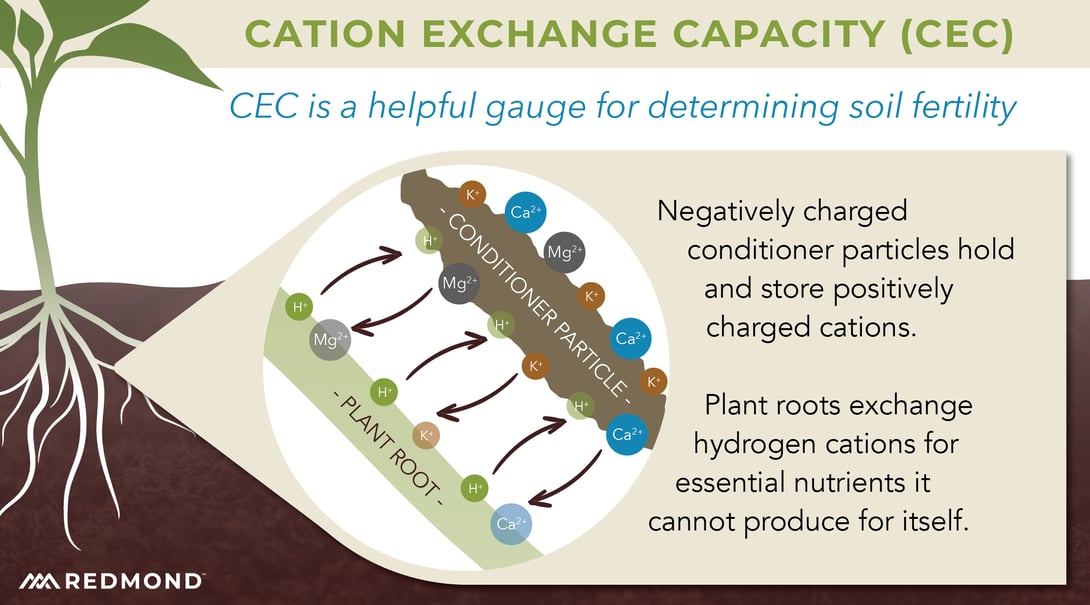Electrical Conductivity (EC)
Soil contains ions: cations (positively charged ions) and anions (negatively charged ions). The attraction of these opposingly charged particles allows soil to transmit a measurable electrical current. This current is the highway system through which nutrients can move through the soil and become available to living things.
The EC of a patch of soil is measured in miliSiemens per meter (mS/m) or deciSiemens per meter (dS/m) and can provide a lot of helpful information about soil health.
EC readings can reveal:
- Plant nutrient availability
- Salinity of soil
- Soil micro-organism activity
- Soil texture type (and its water permeability)
- Overall soil health
Measuring EC levels
EC meters are readily available at most garden centers. If you have your soil regularly tested, you can also request an EC measurement for your samples as well. Just remember that EC levels can greatly vary within an expanse of soil (especially due to changing water levels). Some crops tolerate a wider range of EC levels, while others prefer a more narrow threshold.
Cation Exchange Capacity (CEC)
Cation exchange capacity (CEC) is a measurement of soil’s ability to hold positively charged ions (cations) by using electrical attraction. When soil can hold onto essential nutrients and minerals, they are more available to plant roots that need them for survival. Cations can be held and stored in the soil by negatively charged colloids:
- Clay particles
- Humates (decomposing organic matter)

These colloid particles consist of flat, thin plates with a lot of negatively charged surface area to hold and store large quantities of cations. A plant can then trade for the nutrients it can’t produce with hydrogen cations it can produce. This exchange is continually taking place between the roots and the negatively charged particles in the soil. That means CEC is a very useful gauge for soil fertility, because if the soil is efficiently storing cations, plants have access to the nutrition they need.
Important Cations
According to University of Georgia’s Ag Extension, the most abundant exchangeable cations in soil are: (+ shows the strength of the positive charge)
- Calcium (Ca++)
- Magnesium (Mg++)
- Potassium (K++)
Essential but less abundant cations:
- Ammonium (NH4+)
- Sodium (Na+)
- Aluminum (Al+++)
- Iron (Fe++ or Fe+++)
- Manganese (Mn++)
- Copper (Cu++)
- Zinc (Zn++)
Learn more about how these essential plant nutrients (and more) affect plant growth.
How To Increase CEC
Growers who want to increase their soil’s CEC and improve fertility levels can add:
- Lime (to increase the pH*)
- Clay conditioners
- Organic matter
*As the pH of soil increases (and becomes less acidic) the CEC increases as well. This occurs because as the pH increases, there are more negatively charged stations on the colloids to hold more cations. Learn more about how to test and amend your soil to improve texture, nutrient availability, and pH balance.
Improving Your Soil With Redmond Minerals
Redmond Minerals is founded upon the principle of nourishing the world from the ground up. We know that feeding our soil will create long lasting benefits for the entire food chain. Our mineral mixes and conditioners are harvested from our ancient, deep sea mineral deposit in central Utah. With a naturally balanced nutrient profile of over 60 macro and micro minerals and our rich layer of volcanic ash clay, we know we are sharing the best nature has to offer. With mineral anions and cations continuously leaching from our soils, it is important to maintain a healthy soil amendment program.
Balance Of Clay And Mineral Salts
Redmond knows that nourishment starts from the ground up. Simply put, we are what our food eats. Plants grown in nutrient rich soil pass along those benefits all the way up the food chain. Our Mineralyte Soil Products are OMRI Listed® organic soil amendments that improve the fertility of your soil to grow healthier, more productive, and more nutrient dense plants. Mineralyte contains:
- Redmond volcanic conditioner
- Redmond sea minerals
- Humates
- Poultry Manure (available in Grow)
-02-Aug-01-2025-09-44-33-9024-PM.png?width=1090&height=606&name=Soil%20(EC%2c%20Cation%20Exchange)-02-Aug-01-2025-09-44-33-9024-PM.png)
Our soil products contain a mix of volcanic clay conditioner, a full spectrum of sea minerals, and rich humates to energize the soil and improve EC levels, stimulate soil microbe activity, increase soil CEC levels and provide a more complete nutrient profile for your plants to enjoy. The ingredients in Mineralyte compliment each other and work together to help plants thrive.
- Learn more about how sea minerals can boost the fertility of your soil.
© 2024 Redmond Minerals Inc.

-03.png)
